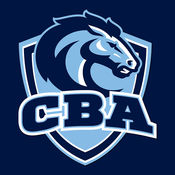Benefits of Multiple Sport Participation
At Christian Brothers Academy, we believe that it is healthier for our students to participate in as many sports and activities as possible. All of the research shows that sport-specialization harms our student-athletes, physically, mentally, and emotionally. Although many student-athletes and parents justify sport-specialization by claiming it is the only way to get a college scholarship, data shows this to be untrue. Check back for updated research articles and information that will help inform you on the dangers of sport-specialization, as well as the benefits of multi-sport participation.
Research Articles on Sport-Specialization
Is it Wise to Specialize? Changing the Game Project
Who Usually Wins Between One-Sport vs. Multi-Sport Athletes? Urban Meyer's Recruiting Philosophy
Specialization: Does it Ensure a College Athletic Career?
The information below comes from Joe Santa, CAA (Warsaw, Indiana)
(published in the Summer 2010 edition of Interscholastic Athletic Administration.)
The multiple-sport athlete is important to all high school athletic programs. In order for programs to be as successful as possible, they need the best athletes competing in a variety of sports.
Coaches understand that talented athletes bring to the table fantastic skills, a competitive spirit and a drive to succeed. When a sport program loses an athlete, the potential for success takes a hit. If the athlete is simply giving up the sport, then the program, depending upon the age of the athlete, could take a hit for two or three years.
Multiple-sport participation also benefits student-athletes as they are exposed to a variety of activities and team situations. Unfortunately, athletes today are making the decision to specialize at younger ages. Often, these decisions are not being made based upon the wants and needs of the athlete, but are upon pressure from outside influences including non-school (club, travel, AAU) team coaches, parents and unfortunately, other high school coaches who push the students into making this tough decision.
Why Specialization?
Specialization is often listed as the main reason schools are losing multiple-sport athletes. Elite athletes, in many cases, have been told by numerous people (most of whom don’t have the overall well being of the youngster at heart) that they need to concentrate on one sport so they can secure scholarship money they will need to attend college, and that college coaches are not going to notice them in high school competition.
Driven by this belief, parents will invest in private lessons, emphasize playing more games in one sport, and spending thousands of dollars for camps and schools for the purpose of achieving a college athletic scholarship.
Research shows that there is a very low probability of attaining a full athletic scholarship or any athletic money of any amount. Less than one percent of high school students receive athletic scholarship money. There is a far greater possibility of receiving a scholarship based on academic prowess or financial need than for skills in a particular sport. In fact, research shows that the ratio of academic scholarships to athletic scholarships is 70-to-1.
The groundbreaking University of Maine athletic initiative “Sports Done Right” reports that there is no evidence anywhere that a bigger investment in sports at a younger age will lead to a bigger chance of receiving an athletic scholarship to college.
More and more, college coaches are looking for youngsters that stayed involved in more than one high school sport. Athletes who specialize are more likely to be those that burn out in college or simply lose the competitive edge needed at a higher level.
College coaches like to see the competitiveness that comes with being a multiple-sport athlete. Dane Fife, a head Division One men’s basketball coach and an all state football and basketball player in high school, believes that playing two sports helped him develop a mindset and a physical presence to be a successful athlete at Indiana University. He feels that multiple sport kids find themselves in more pressure situations during competition and can successfully handle these situations.
What are the benefits of multiple-sport participation?
Improved Health and Wellness. Kids who are involved year-round in one sport find themselves getting injured at an alarming rate. Overuse injuries now account for more than half of the injuries to youth sport participants. These types of injuries are stress fractures, compartment syndrome, and joint fractures.
Dr. Daniel Green, a pediatric orthopedic surgeon in New York City, says, “20 years ago it was rare for an ACL operation for anyone younger than age 15; now it’s commonplace.”
Dr. James Andrews, the nationally prominent orthopedic surgeon known for “Tommy John” surgery, is now treating four times as many youth who suffer from stress related injuries as he used to in earlier years. Since 2004, he has conducted more than 50 “Tommy John” surgeries on youngsters.
Tim Garl, athletic trainer at Indiana University for more than 25 years, believes that overuse combined with inadequate coaching has caused the increase in injuries: “We are training our adolescent athletes as little adults when they are still children with muscle, bone, and organ development still taking place.” He also believes the mental stress that results from being tired of doing something over and over again contributes to the high injury rate in kids today, as “fatigue is a major risk factor in any athlete.”
Improved Athletic Performance. Youngsters who participate in multiple sports as they grow see their athletic abilities improve faster than those who specialize at a younger age. Dr. Joel Brenner, Director of Sports Medicine at the Norfolk (Virginia) Children’s Hospital, believes that multiple-sport participation leads to better conditioning, better balance, and better coordination while generally making the child a better athlete.
Skills used in one sport will often cross over to another activity. In a study of national team members conducted at the University of Queensland in Australia, it was found that athletes who participated in multiple sports as youths were able to reach “expert” status faster, as they were better able to transfer skills, than those who specialized in only one sport. The researchers concluded that kids playing multiple sports needed less time to excel at another sport because skills learned are transferable.
Future Opportunities – The Rest of Your Life. When looking back on his career in athletics, Mike Weaver, the CEO of Weaver Popcorn, the largest popcorn manufacturer in the world, sees many life lessons learned by his participation in athletics. A three sport athlete in high school, Weaver went on to play basketball at Northwestern University. He believes that he learned humility through his athletic participation. Not a star in football or track in high school, he had to accept a role on these teams for the betterment of the entire team: “If you only do what you are best at all of the time, you won’t learn anything else. You will become isolated and focused on only one thing.” As an employer, Weaver looks for employees who were athletes and believes these individuals are more qualified to handle the many types of situations they face in the workplace every day.
This thought is echoed by Microsoft executive Lisa Brummel, who believes there are tremendous advantages to hiring athletes. Companies seek employees who can stand out in pressure situations, demonstrate leadership, and will react positively to the instruction of their superiors: “Athletes in companies are universally respected as high performers. Playing on a team, the understanding of team dynamics and roles, knowing when to step up or when to let someone else step up, and collaboration….if you come from sports, you know these things already.”






